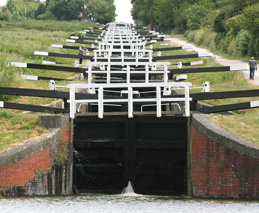In a landmark decision today at Bristol County Court judgement was given in favour of British Waterways' interpretation of Section 17 of the British Waterways Act 1995 relating to Continuous Cruising in the case of Kennet & Avon Canal boater, Paul Davies.
 |
K&A boater, Paul Davies who could be made homeless by today's court decision. Picture by Bob Naylor |
Deputy Judge O’Malley found that the defendant Paul Davies had not complied with the requirements of the 1995 Waterways Act and that British Waterways was justified in bringing the legal proceedings against him.
In court it was claimed that Davies kept his boat on the Kennet & Avon Canal in the Bradford upon Avon area and did not respond to BW’s repeated warnings that his boat movement was not sufficient to meet the licensing requirements.
BW claimed that to qualify for a BW boat licence, a boat must have a home mooring, which they defined as somewhere that it may be lawfully kept when not being used for cruising but they did accept that an exception is made for boats which they describe as ‘bona fide’ navigating throughout the period of the licence.
The court accepted that Davies did not move sufficiently or agree to comply with BW's other terms and conditions. Consequently BW refused Davies' application to license his boat and because the boat is his home BW followed its usual procedure of asking the Court to decide on the case.
There was little or no dispute as to the extent of Davies’ boat movements and central to the issue considered by the court was the meaning of the term ‘bona fide navigation’.
Judge O’Malley noted that Davies’ purpose in keeping the boat on the short stretch of canal between Bath and Bradford upon Avon was so that his home was within convenient distance of his place of work and his social circle, and that his purpose in moving the boat was to avoid the requirement to have a permanent mooring.
The Judge said, “What is clear to me is that the defendant who is clearly living on the boat cannot successfully claim that he is using it ‘bona fide for navigation’ by moving it every so often up and down a short stretch of canal.”
This is the first time that the legal requirements for continuous cruising have been tested in court and BW say that they welcome the judgement saying that it includes helpful comments which have enabled them to refine the Mooring Guidance.
Following the decision Davies has three months — until 30 June 2011 — according to the interpretation that BW have put on the judgement , to remove his boat from their waters.
This is not the view taken by either Paul Davies or his legal representatives who understand the judgement to say that he has that period of time to 'regularise' his mooring situation. Which they take to mean that in that time he must find a permanent mooring.
This is not the view taken by either Paul Davies or his legal representatives who understand the judgement to say that he has that period of time to 'regularise' his mooring situation. Which they take to mean that in that time he must find a permanent mooring.
Sally Ash, Head of Boating at British Waterways, said, “Today’s decision is a great help in bringing greater clarity to a subject which has caused much debate and difficulty within the waterways community. We very much welcome continuous cruising on our canals and rivers and are, as a result of the Learned Judge’s findings, refining our Mooring Guidance.
"The refined Guidance which is based on professional legal advice, including that from Leading Counsel, will be published on our website and we will be inviting representatives of national boating user groups to discuss these.”
Note:
The decision in the case of British Waterways v Davies does not set a binding legal precedent but it can be persuasive on courts of equal or lower standing.
More on this story: K&A Canal Boating Community website
Comments: KAcanalTimes welcomes comments on all postings, however one comment on this story has been removed on legal advice because it could be construed as encouraging or assisting crime under the Part 2 of the Serious Crime Act 2007 which came into force on 1st Oct 2008
See comments below:
More on this story: K&A Canal Boating Community website
Comments: KAcanalTimes welcomes comments on all postings, however one comment on this story has been removed on legal advice because it could be construed as encouraging or assisting crime under the Part 2 of the Serious Crime Act 2007 which came into force on 1st Oct 2008
See comments below:



















